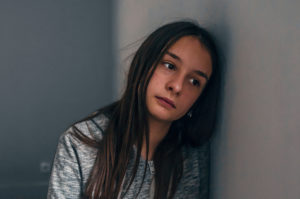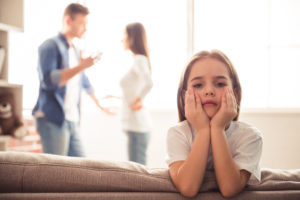In a previous blog we talked about the value of teaching your child the rules of relationships as they are beginning to process feelings of self-awareness and empathy to others. Children who respect themselves and have realistic expectations of their relationships with others grow to have a more balanced outlook on friendships, dating and marriage. It’s imperative as the adults and role models in their lives that we provide healthy examples for them to emulate. That is easier said than done though when as parents we experience a life changing event like the loss of a spouse whether through death or divorce.
In this blog, let’s walk through some of the ways our young people pick up cues from our behaviors and put them into play in their relationships for good or for bad. “It’s so important that we remind ourselves, especially at our toughest times, that our young people are looking to us for direction,” explains Relationship Coach and 1 True Match Founder Renee Richel. “This is also a time when prayer and even a bible study group can provide the foundational support, needed to maintain our emotional and mental strength.”
An Emotional Roller Coaster for Kids
 We know adolescence can be a difficult time from the growth spurts, the roller coaster of hormones and the almost painful self-awareness teens, especially young girls are experiencing. They are going through this strange and awkward time where they’re no longer a kid, but they’re also not a grown-up. Their peers all of a sudden have an avalanche of influence over them and trusted adults are now met with skepticism and doubt. Throw in a divorce or the death of a close loved one and you can have a daily emotional mine field to navigate
We know adolescence can be a difficult time from the growth spurts, the roller coaster of hormones and the almost painful self-awareness teens, especially young girls are experiencing. They are going through this strange and awkward time where they’re no longer a kid, but they’re also not a grown-up. Their peers all of a sudden have an avalanche of influence over them and trusted adults are now met with skepticism and doubt. Throw in a divorce or the death of a close loved one and you can have a daily emotional mine field to navigate
There is good news though, and this isn’t meant in any way to sound over simplified but the key to combating this level of upheaval is to provide a secure emotional base where your child feels loved and accepted, no matter what’s going on in their life or yours. A strong family base no matter what that family looks like is the most important component to building and supporting a child’s confidence, hopefulness and healthy sense of self. This comes from consistency, clearly communicated expectations and agreed upon boundaries. These are healthy foundations and boundaries to have for young people, parents, partners and ex-partners.
Studies have shown that supportive and close family relationships can even prevent your child from risky behaviors like alcohol and other drug use, and problems like depression. But what happens when the family unit is disrupted by a divorce? It can be the emotional equivalent of a bomb being dropped in the middle of a family. There is also the likelihood that the road leading to the separation or divorce has been rocky for a while. That means the entire family is dealing with the breakup and its aftermath. The tough thing here is that while as a partner you are in pain – the parent in you is being watched by your children on how to navigate this tumultuous time and how their lives are going to change.
There will be short and long-term effects
Those long-term effects on young people has a lot to do with how parents handle their own divorce. People with divorced parents are disproportionately likely to marry other people with divorced parents. Couples in which both partners are children of divorce are more likely to get divorced than couples in which just one person is. Parental divorce often leads to low trust among children, and women from divorced families have reported “less trust and satisfaction in romantic relationships”. Another study has shown that individuals with divorced parents are more likely to believe that relationships should be approached with caution. So, how do you prevent contributing or put a stop to a generation of divorce?
What Not to Do:
 Forcing them to pick sides this leads to further tension and argument in the family.
Forcing them to pick sides this leads to further tension and argument in the family.- Bad mouthing your ex-spouse or judging them – children will learn that they can’t really trust that people will tell them the truth.
- Telling a child, they are just like the other parent can also make them start to dislike themselves if they are being compared to the bad things about someone they love.
- Treat them as your friend who will comfort you during your pain. Not crying on your kids’ shoulders is incredibly hard, they know what the family is going through and can share your pain. But it is not healthy for them in the short or long term.
- Spending less family time – the reduced presence of a father specifically in girls tends to harm their educational prospects and physical health—as well as their marriages, which are more likely to end in divorce.
Linda Nielsen, a professor at Wake Forest University who studies father-daughter relationships, has found that girls who grow up “hungry for a better and deeper relationship with their fathers,” she says, often try to satiate that hunger “very quickly, with the first guys that come along.”
The age of your child will also have a lot to do with their reaction and your response to them. Younger children tend to become needier and clingier whereas teenagers tend to respond with anger and withdrawal. This is a very precarious time for your teenager. You want to be aware that teens may turn to alcohol or drugs to cope or become obsessed with over achievement in hopes of making things right within the family, neither is healthy.
The Marriage Ended But Not Your Love For Them
 We know that no one gets married with the expectation of getting divorced – divorce isn’t good for anyone in the family. But this is a time, as tough as it may be, for parents to begin co-parenting in a positive way to show their children that despite their differences they are still a family that is safe and reliable. They should be taught from this experience that marriage is hard and sometimes it doesn’t work out. Instead of being miserable or feeling unloved, sometimes the decision to live separately is a decision that will result in less stress and a happier home. This leads to children who are more relaxed, happier and confident.
We know that no one gets married with the expectation of getting divorced – divorce isn’t good for anyone in the family. But this is a time, as tough as it may be, for parents to begin co-parenting in a positive way to show their children that despite their differences they are still a family that is safe and reliable. They should be taught from this experience that marriage is hard and sometimes it doesn’t work out. Instead of being miserable or feeling unloved, sometimes the decision to live separately is a decision that will result in less stress and a happier home. This leads to children who are more relaxed, happier and confident.
“Even though your divorce may cause you a lot of pain, it’s important to keep in mind the example you set will have an impact on your children’s view of marriage and the likelihood of repeating this in the next generation,” adds Richel. “Which I know is the last thing any parent wants for their child.” If you’d like help with how to talk with your child or teen about dating or how to help them navigate a breakup – yours, or theirs, please give us a call we are here for you!

Young Life is a national organization to help young people build bridges of authentic friendships and have a more Christ like environment if they are facing struggles at home for whatever reason. Click here for more information or if you would like to support their mission.


